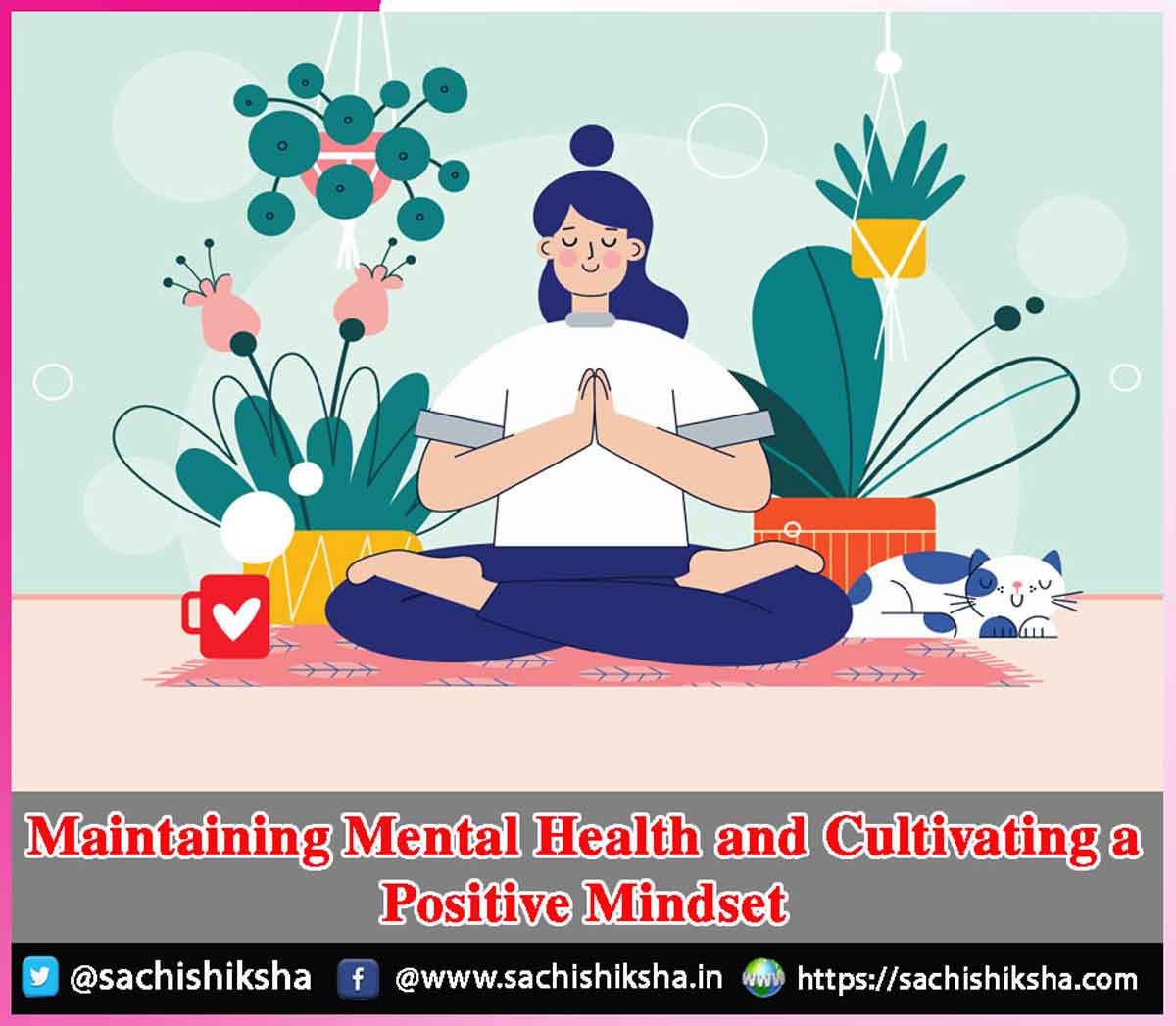Maintaining Mental Health and Cultivating a Positive Mindset
In our fast-paced world, where the pressures of daily life often overshadow our personal well-being, focusing on mental health and cultivating a positive mindset are more crucial than ever.
Introduction: Mental health is a fundamental aspect of our overall well-being, yet it is often overshadowed by physical health concerns. It encompasses our emotional, psychological, and social functioning, influencing how we think, feel, and interact with others. Understanding mental health is crucial for fostering a balanced and fulfilling life. This article explores the importance of mental health, common challenges, and strategies for improvement.
Table of Contents
The Significance of Mental Health
Mental health is integral to leading a happy and productive life. It impacts our daily activities, relationships, and overall quality of life. Good mental health allows individuals to manage stress effectively, work productively, and contribute positively to their communities.
Key Components of Mental Health
- Emotional Well-being: It is the ability to recognize, understand, and manage our emotions. Emotional well-being involves feeling a range of emotions in response to life experiences and being able to cope with them constructively.
- Psychological Functioning: Our cognitive processes include thought patterns, perception, and mental clarity. Good psychological functioning allows us to process information accurately, make sound decisions, and handle stress.
- Social Well-being: It is the quality of our relationships and social interactions. Social well-being is characterized by meaningful connections with others, a sense of belonging, and effective communication skills.
The Current Mental Health Landscape
Recent years have highlighted the growing need to address mental health concerns. According to the World Health Organization (WHO), mental health issues such as anxiety and depression are rising globally. Factors contributing to this increase include societal pressures, economic uncertainties, and the impact of social media.
People may be hesitant to seek help due to the stigma associated with mental disorders. Education and open conversations about mental health are essential in reducing this stigma and encouraging people to prioritize their mental well-being.
Positive Mindset
A positive mindset is a powerful tool that can transform our experiences and outlook on life. It’s not just about maintaining a cheerful disposition but involves a proactive approach to handling life’s challenges and opportunities.
The Importance of a Positive Mindset
A positive mindset is more than just maintaining an optimistic outlook. The research has shown that a positive mindset can lead to better mental health, improved physical health, and greater overall life satisfaction.
Benefits of a Positive Mindset
- Reduced Stress: A positive mindset can help manage stress more effectively. Positive thinkers are more likely to employ problem-solving strategies and seek social support during difficult times.
- Improved Resilience: Positivity enhances resilience, enabling individuals to bounce back from setbacks and face adversity with greater strength.
- Better Relationships: Positivity fosters healthier relationships. Positive individuals are generally more supportive and empathetic, which strengthens their connections with others.
- Enhanced Physical Health: Studies indicate that positive thinking can lead to better immune function and lower rates of chronic diseases.
- Increased Life Satisfaction: Embracing a positive mindset often leads to higher life satisfaction. By focusing on the good aspects of life and finding joy in everyday experiences, individuals can enhance their overall happiness.
Strategies for Maintaining Mental Health
- Build a Support Network: Surrounding yourself with supportive friends and family can provide emotional stability. Social connections offer a sense of belonging and can help alleviate feelings of isolation.
- Engage in Regular Physical Activity: Exercising has been shown to alleviate indicators of sadness and nervousness. The substances like endorphin which are inherent mood improvers, are released during physical exertion.
- Practice Mindfulness and Meditation: Mindfulness and meditation techniques can help manage stress and improve mental clarity. These activities promote mindfulness and can help to eliminate undesirable thought habits.
- Develop Healthy Sleep Habits: Quality sleep is vital for mental health. To increase the amount of sleep you get, stick to a consistent sleep schedule, create a peaceful night time setting, and avoid using devices before bed.
- Adopt a Balanced Diet: Nutrition plays a role in mental health. A diet rich in fruits, vegetables, whole grains, and lean proteins can support brain function and emotional stability.
- Set Realistic Goals: Setting and achieving realistic goals can foster a sense of accomplishment and purpose. Break larger tasks into manageable steps and celebrate small victories along the way.
- Seek Professional Help When Needed: Mental health professionals, such as psychologists and counselors, can provide valuable support and strategies for managing mental health challenges. Therapy and counseling are effective tools for understanding and addressing emotional issues.
- Engage in Hobbies and Interests: Pursuing activities that bring joy and fulfillment can enhance overall well-being. Whether it’s reading, gardening, or painting, engaging in hobbies can provide a healthy escape from stress.
- Practice Self-Compassion: Being kind to yourself during times of difficulty is crucial. Self-compassion involves recognizing that everyone makes mistakes and that it’s okay to seek help when needed.
- Limit Exposure to Negative Influences: Reducing exposure to negative influences, such as toxic relationships or distressing news, can help maintain a positive mindset. Curate your media consumption and focus on sources that uplift and inform.
Cultivating a Positive Mindset
- Practice Gratitude: Keeping a gratitude journal where you regularly write about things you’re thankful for can shift your focus from negative to positive aspects of life. This practice can enhance overall happiness and reduce stress.
- Reframe Negative Thoughts: When faced with a setback, reframe the situation to focus on potential opportunities for growth rather than dwelling on the negatives.
- Visualize Success: Visualization techniques involve imagining positive outcomes and success. This practice can build confidence and motivate you to work towards your goals with a more optimistic perspective.
- Engage in Positive Affirmations: Repeating positive affirmations can boost self-esteem and reinforce a positive mindset. Affirmations should be specific and focused on your strengths and aspirations.
- Surround Yourself with Positivity: Engage with people and environments that promote positivity. Social interactions with uplifting individuals can reinforce a positive mindset and provide encouragement.
- Set and Pursue Personal Values: Identifying and living according to your core values can provide a sense of purpose and direction. Aligning your actions with your values can enhance overall satisfaction and motivation.
- Learn and Grow from Challenges: Viewing challenges as opportunities for growth can foster resilience and optimism. Embrace setbacks as learning experiences and focus on the strengths you develop through adversity.
- Create a Routine: Establishing a daily routine can provide structure and stability, contributing to a more balanced mindset. Include activities that promote well-being, such as exercise, relaxation, and social interactions.
- Engage in Acts of Kindness: Performing acts of kindness, whether big or small, can boost your mood and enhance your sense of connection with others. Helping others often results in personal fulfillment and increased positivity.
- Embrace Humor: Laughter and humor can be powerful tools for maintaining a positive mindset. Engaging with comedy, sharing jokes, or finding humor in everyday situations can alleviate stress and foster a lighter outlook about life.
Conclusion
Maintaining mental health and cultivating a positive mindset are essential for overall well-being and life satisfaction. By focusing on mental health, building a supportive network, practicing self-care, and adopting strategies for positivity, individuals can navigate life’s challenges with greater resilience and optimism. Embracing these practices not only enhances personal well-being but also contributes to a more supportive and positive community. In a world where the demands of life can often feel overwhelming, prioritizing mental health and positivity can create a foundation for a fulfilling and balanced life.
















































